Share
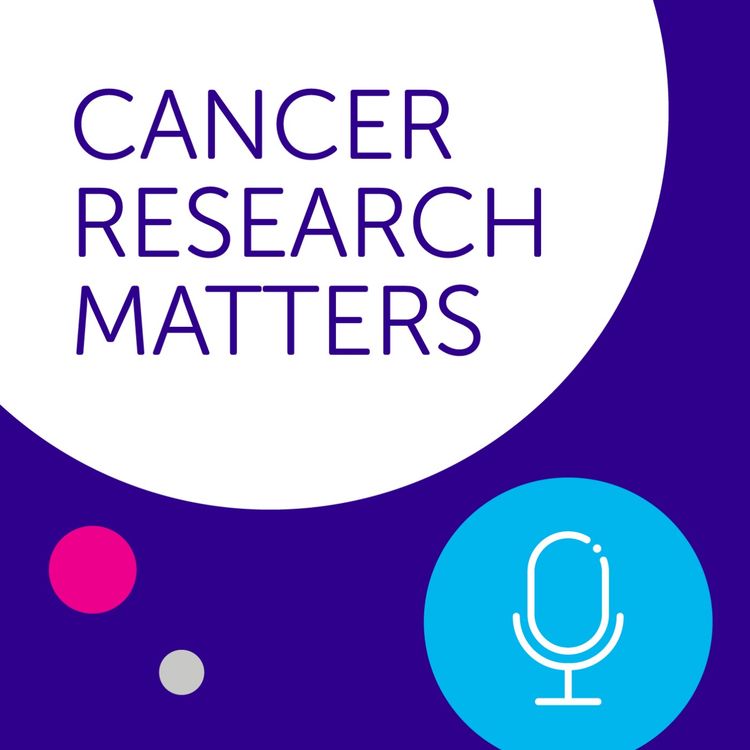
Cancer Research Matters
Microenvironments and early detection - 20 years of proteomics in cancer research
This episode features Sara Zanivan. Sara is a Professor at the Beatson Institute for Cancer where she uses a number proteomics approaches to explore the tumour microenvironment. Her lab also applies their proteomics expertise and capability to develop cancer early detection approaches. Specifically, she is interested in utilising mass-spectrometry to examine how large proteomic changes could be used in the clinic.
She talks about how understanding the tumour microenvironment has developed over the past 20 years, how the techniques of proteomics have really freed researchers to ask the important questions and why we could even see mass-spec proteomics in the clinic.
Further reading on mass-spectrometry and proteomics:
Journal paper:
https://www.nature.com/articles/nature01511
Article:
More episodes
View all episodes
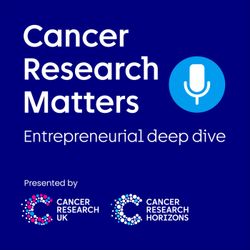
3. Start-up – forging your own path...
33:56||Season 2, Ep. 3There are trials and tribulations ahead, but honestly, could there be anything more exciting than grabbing the reigns of your own translation and driving it forward? In this episode we get to grips with the specifics of forming a start-up company, we speak to some successful academic founders, figure out what you need to think about as you pull the trigger and form your own company and get some behind-the-scenes gems from a biotech investor. Appearing in this episode:Simon BoultonPrincipal Group Leader, The Francis Crick InstituteCo-founder & VP Science Strategy, Artios Pharma LtdChief Translation Advisor, Cancer Research UKSimon’s lab has discovered new DNA repair genes and provided novel insights into cancer. In 2016, Simon helped to establish Artios Pharma Ltd - he is Vice President of Science Strategy alongside his academic roles at the Francis Crick Institute and Cancer Research UK. Phil MastersonAssociate Director, Ventures, Cancer Research HorizonsPhil leads a team focussed on the creation of innovative and transformative oncology ventures, from ideation to launch. Professor Steven PollardFounder & CSO, TrogenixProfessor of Stem Cell and Cancer Biology, University of EdinburghTrogenix is uniting cutting-edge technologies in genomics, oncology, immunotherapy, and gene therapy to create a revolutionary therapeutic approach. Steve's laboratory studies the molecular and cellular mechanisms that regulate stem cell identity and differentiation and how these operate in the context of human cancer. Professor Sophia KaragiannisCo-founder, EpsilogenProfessor of Translational Cancer Immunology and Immunotherapy, Kings Collage LondonSophia heads up a cancer antibody discovery team focused on immune cells and cancer and on the design of novel agents for solid tumours. She is also a founder of Epsilogen Ltd the first immuno-oncology company dedicated to developing IgE therapeutic agents for cancer.Jonathan TobinPartner, Brandon CapitalInvestor-in-residence, Cancer Research HorizonsJonathan is a Partner with Brandon Capital where he heads the London office, and serves on the boards of Brandon portfolio companies Astronautx, Pheon Therapeutics, Myricx Bio, NRG Therapeutics, and Catalym. Professor Ed TateGSK Chair in Chemical Biology, Imperial College LondonSatellite Group Leader, Francis Crick InstituteCo-founder, MyricxbioEd's research focusses on chemical biology and chemical proteomics. Myricxbio which is focused on discovering and developing novel payloads for antibody drug conjugates, based on inhibitors of the enzymes, N-myristoyltransferases (NMT) for the treatment of cancer.Useful links:Cancer Research Horizons Seed fund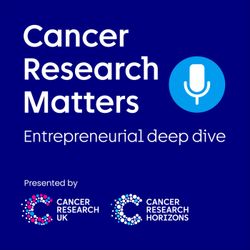
2. Sharpen up – magnificent skills and where to find them...
35:10||Season 2, Ep. 2The special mini-series of Cancer Research Matters takes a deep dive into all things science entrepreneurship.Right, so initial contact has been made… time to take those first steps in an entrepreneurial adventure. However, it’s clear that the many skills you have gathered as an academic – and they are considerable – you’ll need a few more to help you be successful in translating your research. So, what are they? What’s the best way to sharpen up? And how – exactly – can they help? Its all in this episode… plus: Do you know your design rights from your copyright? Me either... luckily we have a patent attorney to give us a vital primer on intellectual property protection. Appearing in this episode:Alessia EricoAssociate Director, Search and Evaluation, and Entrepreneurial Programmes Lead at Cancer Research HorizonsAlessia leads a team responsible for sourcing new opportunities arising from Cancer Research UK-funded science, in the UK and internationally, that have the potential of translating to the clinic.Faith HowardPostdoctoral Research Associate, University of SheffieldCo-Founder at NANOncolyticsFaith is cofounder of NANOncolytics, a company developing nanoparticle technology to provide a less invasive strategy for treating inaccessible and aggressive tumours.Matt de VriesPhD student at the Institute of Cancer Research and Imperial College London,co-founder of Sentinal 4DMatt's work focuses on biomedical applications of 3D computer vision. In 2022, Matt was shortlisted for the Cancer Research Horizons Early Career Entrepreneur of the Year award for his work on co-founding Sentinal 4D.Camille TerfvePartner, Patent Attorney at Mewburn EllisCamille has expertise in bioinformatics/computational biology, digital health, AI in the life sciences, and advanced bioprocessing. Useful links:Entrepreneurship training from Cancer Research HorizonsVenture Builder IncubatorCancer Tech Accelerator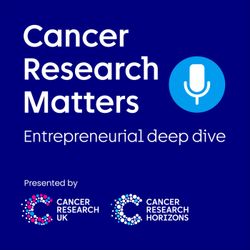
1. First contact – how big things come from small steps…
35:19||Season 2, Ep. 1The special mini-series of Cancer Research Matters takes a deep dive into all things science entrepreneurship.This first episode asks: why should entrepreneurship and translation interest researchers from an academic background? Isn’t this a tricky thing to navigate? What support is available? What kinds of research can be translated and what should researchers do if they think their work could lead to an intervention. It’s all in here – so get stuck in.Appearing in this episode:Simon BoultonPrincipal Group Leader, The Francis Crick InstituteCo-founder & VP Science Strategy, Artios Pharma LtdChief Translation Advisor, Cancer Research UKSimon’s lab has discovered new DNA repair genes and provided novel insights into cancer. In 2016, Simon helped to establish Artios Pharma Ltd where he functions as Vice President of Science Strategy alongside his academic roles at the Francis Crick Institute and Cancer Research UK. Artios are developing new treatments that target DNA repair pathway vulnerabilities to selectively kill cancer cells. Simon is also Chief Translation Advisor at Cancer Research UK, with the remit to guide translation and commercialisation of novel cancer therapeutics.Tony HicksonChief business officer, Cancer Research UK and Cancer Research HorizonsTony leads the Commercial Partnerships team responsible for the commercialisation of IP from Cancer Research UK-funded projects, new start-up creation, licences and corporate alliances.Faith HowardPostdoctoral Research Associate, University of SheffieldCo-Founder at NANOncolyticsFaith’s research interests are focused on delivery of therapeutics to disseminated tumours. This includes nanoenabled formulations and the development of appropriate models for studying immunotherapies. She is cofounder of NANOncolytics, a company developing nanoparticle technology to provide a less invasive strategy for treating inaccessible and aggressive tumours.Tommy RennisonRegional Translation Lead, Cancer Research HorizonsTommy is responsible for sourcing and evaluating potential new projects for Cancer Research Horizons.Phil BerryTranslation Executive at Cancer Research Horizons Phil is responsible for sourcing and evaluating potential new projects for Cancer Research Horizons.Useful linksCancer Research HorizonsCancer Research Horizons entrepreneurial trainingThe Venture Builder IncubatorICURe Programme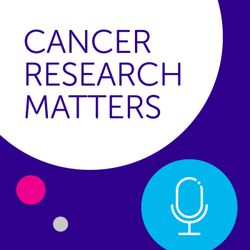
9. Careers and the cutting edge – four themes from a year of cancer research leaders
28:42||Season 1, Ep. 9This episode features a round-up of the best of the first series of Cancer Research Matters. It features some of the fantastic researchers that we have interviewed over the past year – including Professor Steve Jackson, Professor Ruth Plummer, Dr Simon Boulton, Professor Sir Leszek Borysiewicz, Professor Karen Vousden, Professor Richard Gilbertson and Professor Charles Swanton. In this episode I tease out four themes that emerged over this first series that give some interesting insights into how we work as scientists, research leaders and research translators.
8. Break beat – 20 years of understanding genomic instability
28:37||Season 1, Ep. 8Cancer Research Matters, a new Podcast from Cancer Research UK featuring some of the incredible researchers behind cancer research. The idea is to drive and provoke conversation around cancer science, how it shapes our understanding of the disease and the challenges we face as we develop therapies.The first series focusses on the 20th anniversary of CRUK – we’ll be winding back the clock on some of the great discoveries and breakthroughs made in the past two decades and asking some leading names where they think we’ll be in another 20 years.This episode features Dr Simon Boulton. Simon is a leader in the field of DNA damage sensing, repair and telomere maintenance. He is Principal Group Leader and Assistant Research Director of translation at the Francis Crick Institute, and Director of RadNet, City of London – a CRUK initiative focused on improving radiation treatment for cancer patients. Simon is also co-founder and Vice President of Science Strategy of the spin-out Artios Pharma and Chair of CRUK’s Discovery Research Committee.He talks about the dawn of the field of DNA damage repair, why an entrepreneurial approach to your research is so valuable and the importance of venture capital in the innovation landscape. Useful linksExplore the formation of Artios Pharma and the role of Cancer Research Horizons in translationhttps://news.cancerresearchuk.org/2021/11/05/taking-on-dna-repair-to-tackle-cancer/Explore RadNet. Whether you’re a cancer biologist, health professional, engineer or physical scientist, RadNet is an exciting and rewarding opportunity to apply your expertise and knowledgehttps://www.cancerresearchuk.org/funding-for-researchers/our-research-infrastructure/radnet-our-radiation-research-networkRegister your interest for the CRUK-ARR Radiation Research Conference https://forms.office.com/Pages/ResponsePage.aspx?id=L4lzROBx_EaN7Cc5ArUTSeNZ7IzS7O9ItRV1smdjkd1UMDBYRUI1SzRPSThYNTZEUDhSSzZSSUJKVi4u Find out how Cancer Research Horizons can help you translate your workhttps://www.cancerresearchhorizons.com/collaborate-us/researchersListen to Professor Steve Jackson on a previous episodehttps://shows.acast.com/cancer-research-matters/episodes/translation-tales-20-years-of-forming-spinout
7. Stigma, hope and TRACERx: 20 years of understanding lung cancer
30:19||Season 1, Ep. 7This episode features Professor Charles Swanton. Charlie is Cancer Research UK's Chief Clinician and his lab at the Francis Crick Institute studies lung cancer tumour heterogeneity and maps the evolutionary pathways at work as cancers evolve and change.He talks about the profound changes in the way the research community thinks about lung cancer, the power of the translational mind-set and delves into the flagship project, TRACERx.He also talks briefly about his lab’s growing interest in the mechanistic links between air pollution and lung cancer in never smokers.Useful linksExplore how Cancer Research Horizons can help you translate your workhttps://www.cancerresearchhorizons.com/our-expertise/research-translationRead about Charlie’s work on air pollution and lung cancer https://news.cancerresearchuk.org/2021/12/13/its-a-fair-cop-why-our-chief-clinician-went-to-a-climate-change-summit/ScottishPower and Cancer Research UK, working together for a greener, healthier futureOur longstanding partner ScottishPower is helping us shine a light on the role air pollution plays in cancer and are covering the cost of a study called TOPICAL. ScottishPower is 100% committed to helping tackle climate change and our partnership reflects our shared interest in a greener, healthier future.
6. Side effects and sub-types: 20 years of understanding childhood cancer
23:23||Season 1, Ep. 6Cancer Research Matters, a new Podcast from Cancer Research UK featuring some of the incredible researchers behind cancer research. The idea is to drive and provoke conversation around cancer science, how it shapes our understanding of the disease and the challenges we face as we develop therapies. The first series focusses on the 20th anniversary of CRUK – we’ll be winding back the clock on some of the great discoveries and breakthroughs made in the past two decades and asking some leading names where they think we’ll be in another 20 years.This episode features Professor Richard Gilbertson. Richard is a paediatric oncology clinician scientist and is the Director of the Cancer Research UK Cambridge Centre. He has dedicated his career to understanding childhood brain tumours and is perhaps known best for his work identifying different types of medulloblastoma and ependymoma – two of the most common kinds of childhood brain tumour. He talks about the challenges and successes of the childhood cancer research community, how he sees the future of the field and some of the incredible breakthroughs his lab has made on childhood brain cancers. Further reading WNT signalling and brain cancer https://link.springer.com/article/10.1007/s00401-012-0958-8 https://www.sciencedirect.com/science/article/pii/S1535610816300551 Read about CRUK’s data strategy https://news.cancerresearchuk.org/2022/07/07/joining-the-dots-how-our-new-research-data-strategy-will-unlock-the-power-of-big-data/See the data strategy https://www.cancerresearchuk.org/sites/default/files/cancer_research_uk_-_research_data_strategy.pdf
5. Complexity and understanding - 20 years of tumour suppression with Karen Vousden
23:20||Season 1, Ep. 5This episode features outgoing CRUK Chief Scientist, Professor Karen Vousden. Known for her work on the tumour suppressor protein, p53, she has also worked on HPV and cancer metabolism. She has been the director of the Cancer Research UK Beatson Institute in Glasgow, UK, and from 2016 she re-located to become a group leader at the Francis Crick Institute as well as taking up the role of Chief Scientist at CRUK.She talks about the success and challenges of work around p53, her joy at being involved in the early work around HPV, the frustrations of coming so close to a huge breakthrough and how life as a researcher has changed.Further reading on Karen’s work on p53:Article Following the discovery of p53p53 is strictly controlled in the normal cell, Karen discovered that a key element in this regulation is the protein Mdm2. https://www.jbc.org/article/S0021-9258(18)30208-4/fulltextKaren’s work on oncogenes and HPV: https://www.ncbi.nlm.nih.gov/pmc/articles/PMC402081/
4. The creative act of science - 20 years of leadership in cancer research
25:15||Season 1, Ep. 4This episode features CRUK Chairman, Professor Sir Leszek Borysiewicz. Following a distinguished academic and clinical research career, Leszek’s roles have included Chief Executive of the Medical Research Council and Vice Chancellor of the University of Cambridge. He is a founding Fellow of the Academy of Medical Sciences and was awarded a Knighthood in 2001 for his pioneering work on HPV vaccines. Early teenage girls are now routinely vaccinated for HPV, with the UK having among the highest uptake worldwide.He talks about the development of the HPV vaccine, the difficulties of navigating a research career and why we must start to embrace failure… even a negative result, he says, is positive. Further reading on the HPV vaccine:Journal paper: https://www.thelancet.com/journals/lancet/article/PIIS0140-6736(21)02178-4/fulltext Article: https://news.cancerresearchuk.org/2021/11/03/the-power-of-science-hpv-vaccine-proven-to-dramatically-reduce-cervical-cancer/